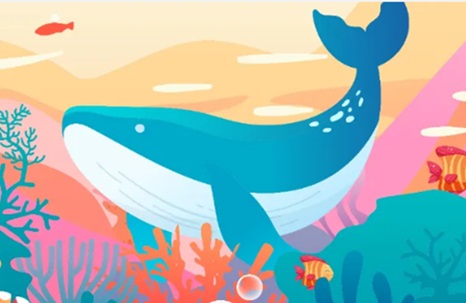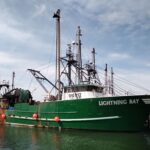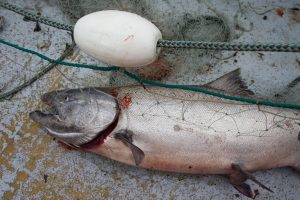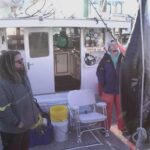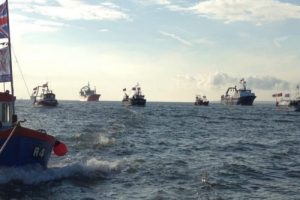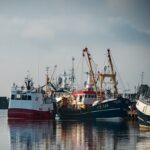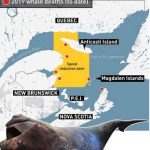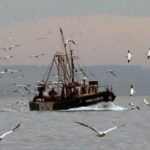 A U.S. appeals court on Monday appeared open to upholding a federal rule requiring commercial fishermen to fund a program to monitor for overfishing of herring off New England’s coast even after the U.S. Supreme Court in that same case issued a landmark ruling curbing agencies’ regulatory power. A three-judge panel of the U.S. Court of Appeals for the District of Columbia Circuit, during oral arguments, weighed the impact of the U.S. Supreme Court’s June decision, opens new tab to scrap a 40-year-old legal doctrine that had required courts to defer to agencies’ interpretations of ambiguous laws they administer. The 6-3 conservative majority U.S. Supreme Court nixed the doctrine, known as “Chevron deference,” after taking up an appeal by several commercial fishing companies of the D.C. Circuit panel’s 2-1 ruling in August 2022, opens new tab that had relied on the doctrine to uphold the fishing rule. more, >>CLICK TO READ<< 07:03
A U.S. appeals court on Monday appeared open to upholding a federal rule requiring commercial fishermen to fund a program to monitor for overfishing of herring off New England’s coast even after the U.S. Supreme Court in that same case issued a landmark ruling curbing agencies’ regulatory power. A three-judge panel of the U.S. Court of Appeals for the District of Columbia Circuit, during oral arguments, weighed the impact of the U.S. Supreme Court’s June decision, opens new tab to scrap a 40-year-old legal doctrine that had required courts to defer to agencies’ interpretations of ambiguous laws they administer. The 6-3 conservative majority U.S. Supreme Court nixed the doctrine, known as “Chevron deference,” after taking up an appeal by several commercial fishing companies of the D.C. Circuit panel’s 2-1 ruling in August 2022, opens new tab that had relied on the doctrine to uphold the fishing rule. more, >>CLICK TO READ<< 07:03Tag Archives: NMFS

Elon, it’s time to sic the DOGE on BOEM, and NMFS By Jim Lovgren
The Trump administration has begun a long overdue financial analysis of the spending habits of federal agencies, looking to weed out waste, fraud, incompetence, bureaucratic overlap of different agencies, and unnecessary regulations. To do this he has recruited Elon Musk, the world’s richest man, who earned his wealth by his shear brilliance, to lead a new agency, called DOGE, Department of Governmental Efficiency. While there are plenty of federal departments that need cleaning up, or elimination, let’s hope that Elon doesn’t overlook BOEM and the NMFS. Let’s start with the Bureau of Ocean Energy Management, the agency that cavalierly sells the ocean bottom and its non-renewable resources to the highest bidder. This is an agency that has always been surrounded by controversy and corruption so bad that they had to change their name years ago from the Marine Minerals Service to its present BOEM. More, >>CLICK TO READ<< 18:57
Court open to upholding US fishing monitor rule even without ‘Chevron’ doctrine
 A U.S. appeals court on Monday appeared open to upholding a federal rule requiring commercial fishermen to fund a program to monitor for overfishing of herring off New England’s coast even after the U.S. Supreme Court in that same case issued a landmark ruling curbing agencies’ regulatory power. A three-judge panel of the U.S. Court of Appeals for the District of Columbia Circuit, during oral arguments, weighed the impact of the U.S. Supreme Court’s June decision, opens new tab to scrap a 40-year-old legal doctrine that had required courts to defer to agencies’ interpretations of ambiguous laws they administer. The 6-3 conservative majority U.S. Supreme Court nixed the doctrine, known as “Chevron deference,” after taking up an appeal by several commercial fishing companies of the D.C. Circuit panel’s 2-1 ruling in August 2022, opens new tab that had relied on the doctrine to uphold the fishing rule. more, >>CLICK TO READ<< 07:03
A U.S. appeals court on Monday appeared open to upholding a federal rule requiring commercial fishermen to fund a program to monitor for overfishing of herring off New England’s coast even after the U.S. Supreme Court in that same case issued a landmark ruling curbing agencies’ regulatory power. A three-judge panel of the U.S. Court of Appeals for the District of Columbia Circuit, during oral arguments, weighed the impact of the U.S. Supreme Court’s June decision, opens new tab to scrap a 40-year-old legal doctrine that had required courts to defer to agencies’ interpretations of ambiguous laws they administer. The 6-3 conservative majority U.S. Supreme Court nixed the doctrine, known as “Chevron deference,” after taking up an appeal by several commercial fishing companies of the D.C. Circuit panel’s 2-1 ruling in August 2022, opens new tab that had relied on the doctrine to uphold the fishing rule. more, >>CLICK TO READ<< 07:03Bering Sea snow crab fishing to resume, but at an ultra-low level to encourage repopulation
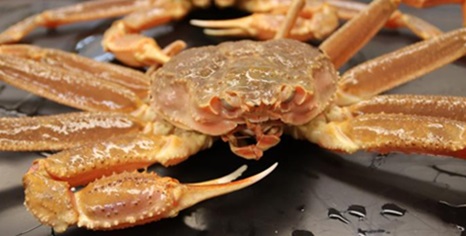 After a two-year hiatus forced by low stocks, the Bering Sea snow crab harvest is back on. The decision to reopen the harvest, announced on Oct. 4 by the Alaska Department of Fish and Game, is based on signs of recovery in the crab populations. The official harvest opening was Tuesday. Signs of recovery are modest, and so is the allowable catch. The harvest is limited to 4.72 million pounds, a level that is a far cry from the 45-million-pound quota used in the 2020-21 season and similarly large quotas in earlier years. This season’s total allowable catch is the smallest in the history of the fishery, said Mark Stichert, the Alaska Department of Fish and Game’s Kodiak-based management coordinator for groundfish and shellfish harvests. more, >>CLICK TO READ<< 19:40
After a two-year hiatus forced by low stocks, the Bering Sea snow crab harvest is back on. The decision to reopen the harvest, announced on Oct. 4 by the Alaska Department of Fish and Game, is based on signs of recovery in the crab populations. The official harvest opening was Tuesday. Signs of recovery are modest, and so is the allowable catch. The harvest is limited to 4.72 million pounds, a level that is a far cry from the 45-million-pound quota used in the 2020-21 season and similarly large quotas in earlier years. This season’s total allowable catch is the smallest in the history of the fishery, said Mark Stichert, the Alaska Department of Fish and Game’s Kodiak-based management coordinator for groundfish and shellfish harvests. more, >>CLICK TO READ<< 19:40
Is New Bedford the top commercial fishing port in the United States?
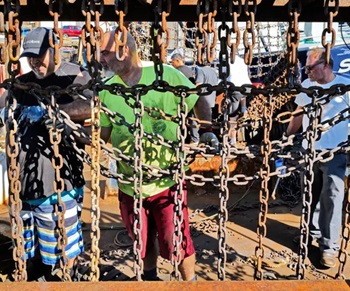 New Bedford takes great pride in its port, and its scallopers account for a significant portion of its value. It’s proven that the Port of New Bedford has great value. New Bedford still ranks as the top commercial fishing port by value as recently as 2022, according to figures released by the National Marine Fisheries Service, Oceanic and Atmospheric Administration, known as NOAA Fisheries. New Bedford had landed $443.2 million worth of seafood in 2022, again placing it at the top of NOAA Fisheries’ revenue list. That’s thanks in large part to all the scalloper landings in New Bedford contributing to the port’s value. Scallop landings accounted for 84 percent of the value. more, >>CLICK TO READ<< 06:22
New Bedford takes great pride in its port, and its scallopers account for a significant portion of its value. It’s proven that the Port of New Bedford has great value. New Bedford still ranks as the top commercial fishing port by value as recently as 2022, according to figures released by the National Marine Fisheries Service, Oceanic and Atmospheric Administration, known as NOAA Fisheries. New Bedford had landed $443.2 million worth of seafood in 2022, again placing it at the top of NOAA Fisheries’ revenue list. That’s thanks in large part to all the scalloper landings in New Bedford contributing to the port’s value. Scallop landings accounted for 84 percent of the value. more, >>CLICK TO READ<< 06:22
Pollock fishery shut down early after unprecedented salmon bycatch in Gulf of Alaska
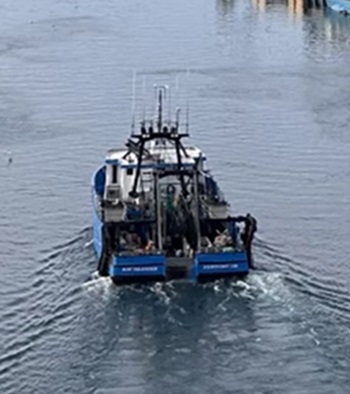 The National Marine Fisheries Service [NMFS] announced Wednesday, Sept. 25 that it was shutting down the rest of the Central Gulf of Alaska pollock season. That’s after reports that the trawler fleet incidentally caught “unprecedented amounts of Chinook salmon” this week, which comes as the issue of salmon bycatch faces mounting scrutiny. Jonathan Kurland, the Fisheries Services acting regional administrator for the Alaska region. said the closure was necessary to “prevent exceeding the 2024 Chinook salmon prohibited species catch limit.” The Kodiak-based trade group Alaska Groundfish Data Bank said in a press release on Sept. 24 that two fishing vessels trawling for pollock on Sept. 22 came upon a hotspot of Chinook salmon, which the organization described as an “extremely unprecedented amount.” The vessels were in an area adjacent to Kodiak Island. more, >>CLICK TO READ<< 15:01
The National Marine Fisheries Service [NMFS] announced Wednesday, Sept. 25 that it was shutting down the rest of the Central Gulf of Alaska pollock season. That’s after reports that the trawler fleet incidentally caught “unprecedented amounts of Chinook salmon” this week, which comes as the issue of salmon bycatch faces mounting scrutiny. Jonathan Kurland, the Fisheries Services acting regional administrator for the Alaska region. said the closure was necessary to “prevent exceeding the 2024 Chinook salmon prohibited species catch limit.” The Kodiak-based trade group Alaska Groundfish Data Bank said in a press release on Sept. 24 that two fishing vessels trawling for pollock on Sept. 22 came upon a hotspot of Chinook salmon, which the organization described as an “extremely unprecedented amount.” The vessels were in an area adjacent to Kodiak Island. more, >>CLICK TO READ<< 15:01
Coast Guard halts voyage for illegal fishing off Key West
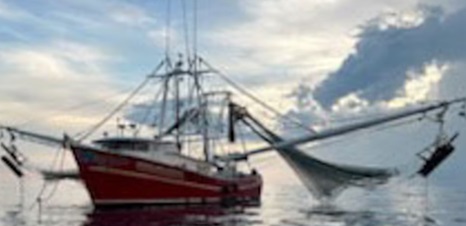 A Coast Guard Station Key West law enforcement boat crew boarded a commercial fishing vessel, Thursday, approximately 12 miles off the Marquesas Keys, for a routine commercial fishing vessel safety inspection and discovered the crew was fishing with an expired permit. Working with our National Marine Fisheries Service regional partners, the Coast Guard terminated the vessel’s voyage due to their possession of 45,000 pounds of pink shrimp on board without a valid commercial fishing permit. The vessel is returning to its homeport in Alabama where NMFS officers will meet with captain for further questioning. The name of the vessel is being withheld due to the open investigation. more, >>CLICK TO READ<< 13:53
A Coast Guard Station Key West law enforcement boat crew boarded a commercial fishing vessel, Thursday, approximately 12 miles off the Marquesas Keys, for a routine commercial fishing vessel safety inspection and discovered the crew was fishing with an expired permit. Working with our National Marine Fisheries Service regional partners, the Coast Guard terminated the vessel’s voyage due to their possession of 45,000 pounds of pink shrimp on board without a valid commercial fishing permit. The vessel is returning to its homeport in Alabama where NMFS officers will meet with captain for further questioning. The name of the vessel is being withheld due to the open investigation. more, >>CLICK TO READ<< 13:53
This Florida fisherman worries about the industry’s future
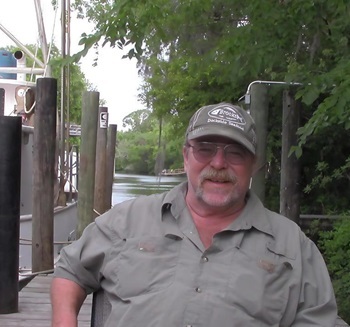 Commercial fishing is vital to Florida’s culture and identity. Today, Florida fishermen like me land $209 million worth of fish and shellfish in dock-side value alone. The economic impact of the commercial fishing industry ripples up the supply chain generating $8.7 billion. Hundreds of millions of tourists travel to Florida to enjoy fresh seafood in the Sunshine State. The National Marine Fisheries Service (NMFS) “Status of the Stocks” report that was recently released would have you believe that everything is rosy. But let me tell you what’s really happening – what you don’t see in that federal report – from the perspective and experience of someone who makes a living on the water in the Gulf of Mexico. more, >>CLICK TO READ<< 07:29
Commercial fishing is vital to Florida’s culture and identity. Today, Florida fishermen like me land $209 million worth of fish and shellfish in dock-side value alone. The economic impact of the commercial fishing industry ripples up the supply chain generating $8.7 billion. Hundreds of millions of tourists travel to Florida to enjoy fresh seafood in the Sunshine State. The National Marine Fisheries Service (NMFS) “Status of the Stocks” report that was recently released would have you believe that everything is rosy. But let me tell you what’s really happening – what you don’t see in that federal report – from the perspective and experience of someone who makes a living on the water in the Gulf of Mexico. more, >>CLICK TO READ<< 07:29
Nantucket Group Fighting Vineyard Wind Will Take Case To U.S. Supreme Court
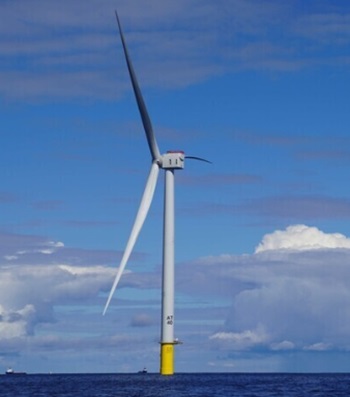 After its arguments against the Vineyard Wind project were rejected by a federal judge in April, the Nantucket group ACK 4 Whales will attempt to take its case to the U.S. Supreme Court. “There are no do-overs when the last whale is killed off,” said Val Oliver, president of ACK 4 Whales. “We will be seeking a writ of certiorari to the Supreme Court to ask for the reversal of the First Circuit’s legal errors made in our case,” Oliver added. “We believe this is the first cert. petition being filed in the wake of the Supreme Court’s decision in Loper Bright to challenge offshore wind development..” After its arguments against the Vineyard Wind project were rejected by a federal judge in April, the Nantucket group ACK 4 Whales will attempt to take its case to the U.S. Supreme Court. more. >>CLICK TO READ<< 13:45
After its arguments against the Vineyard Wind project were rejected by a federal judge in April, the Nantucket group ACK 4 Whales will attempt to take its case to the U.S. Supreme Court. “There are no do-overs when the last whale is killed off,” said Val Oliver, president of ACK 4 Whales. “We will be seeking a writ of certiorari to the Supreme Court to ask for the reversal of the First Circuit’s legal errors made in our case,” Oliver added. “We believe this is the first cert. petition being filed in the wake of the Supreme Court’s decision in Loper Bright to challenge offshore wind development..” After its arguments against the Vineyard Wind project were rejected by a federal judge in April, the Nantucket group ACK 4 Whales will attempt to take its case to the U.S. Supreme Court. more. >>CLICK TO READ<< 13:45

An Optimist’s view: Death of the Chevron Deference
My name is David Goethel. I am a 55 year plus commercial fisherman, research biologist and former fishery manager. As author of Endangered Species/Chronicles of A new England Fisherman I discuss these topics and a lawsuit I filed in 2015 with the legal group Cause of Action over the legal concept known as Chevron Deference. Most people believe Congress writes laws, the Executive Branch carries out those laws and the Judicial Branch interprets and clarifies whether aspects of those laws are Constitutional and correctly applied. It turns out under a doctrine called “Chevron Deference” the regulatory bureaucracy can deem a law unclear or ambiguous and create any regulation the agency decides it needs to carry out its bureaucratic function. Until this past Friday, the courts gave deference to the regulators as the “recognized experts” even though no proof is required and no test for ambiguity is applied. The Supreme Court overturned Chevron Friday saying they had “placed a tombstone on its grave”. Fishermen, including me, had sued saying that unelected regulators should not have this vast power over our lives. more, >>CLICK TO READ<< 20:18
Fishermen Who Were Forced to Pay $700 Per Day to Government-Mandated Observers on Their Boats Get Big News from SCOTUS
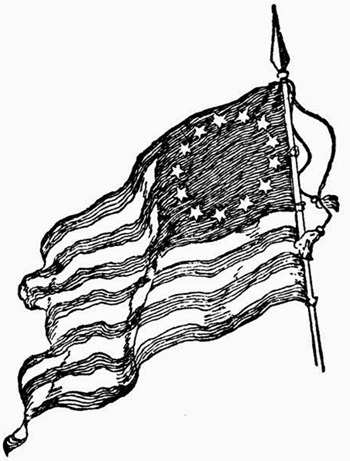 Members of the 18th-century British Parliament, unelected by American colonists, tried to take money from those colonists without their consent. Hence, the American Revolution ensued. On Friday, the U.S. Supreme Court overturned a 40-year-old ruling that had allowed unelected federal regulators, acting the part of the British Parliament, to commit such travesties of justice as requiring fishermen to pay for government-mandated regulators on their boats — a requirement that, according to CBS, could cost the fishermen more than $700 per day. The true magnitude of Friday’s ruling, however, involved far more than fishing boats. In fact, it struck at the heart of American progressivism by eviscerating the insidious claim that federal “experts” know best. In so doing, it took one small-but-crucial step towards dismantling the permanent federal state that actually governs in Washington, D.C. more, >>CLICK TO READ<< 11:18
Members of the 18th-century British Parliament, unelected by American colonists, tried to take money from those colonists without their consent. Hence, the American Revolution ensued. On Friday, the U.S. Supreme Court overturned a 40-year-old ruling that had allowed unelected federal regulators, acting the part of the British Parliament, to commit such travesties of justice as requiring fishermen to pay for government-mandated regulators on their boats — a requirement that, according to CBS, could cost the fishermen more than $700 per day. The true magnitude of Friday’s ruling, however, involved far more than fishing boats. In fact, it struck at the heart of American progressivism by eviscerating the insidious claim that federal “experts” know best. In so doing, it took one small-but-crucial step towards dismantling the permanent federal state that actually governs in Washington, D.C. more, >>CLICK TO READ<< 11:18
Neil Gorsuch Cheers Supreme Court Placing ‘Tombstone’ on 40-Year Precedent
 In Friday’s 6-3 ruling in Loper Bright Enterprises v. Raimondo, the justices wiped out 40 years of administrative law precedent in a move that will restrain federal agency powers. The court’s decision overturned the Chevron deference established in the 1984 case Chevron v. Natural Resources Defense Council. The majority, led by Chief Justice John Roberts and joined by the court’s other conservative justices, held that “courts may not defer to an agency interpretation of the law simply because a statute is ambiguous,” overturning Chevon deference. The court’s three liberal justices dissented. The majority, led by Chief Justice John Roberts and joined by the court’s other conservative justices, held that “courts may not defer to an agency interpretation of the law simply because a statute is ambiguous,” overturning Chevon deference. The court’s three liberal justices dissented. In Gorsuch’s concurring opinion, he wrote: “Today, the Court places a tombstone on Chevron no one can miss. In doing so, the Court returns judges to interpretive rules that have guided federal courts since the Nation’s founding.” more, >>CLICK TO READ<< 15:49
In Friday’s 6-3 ruling in Loper Bright Enterprises v. Raimondo, the justices wiped out 40 years of administrative law precedent in a move that will restrain federal agency powers. The court’s decision overturned the Chevron deference established in the 1984 case Chevron v. Natural Resources Defense Council. The majority, led by Chief Justice John Roberts and joined by the court’s other conservative justices, held that “courts may not defer to an agency interpretation of the law simply because a statute is ambiguous,” overturning Chevon deference. The court’s three liberal justices dissented. The majority, led by Chief Justice John Roberts and joined by the court’s other conservative justices, held that “courts may not defer to an agency interpretation of the law simply because a statute is ambiguous,” overturning Chevon deference. The court’s three liberal justices dissented. In Gorsuch’s concurring opinion, he wrote: “Today, the Court places a tombstone on Chevron no one can miss. In doing so, the Court returns judges to interpretive rules that have guided federal courts since the Nation’s founding.” more, >>CLICK TO READ<< 15:49
What does a California ban on salmon mean for the livelihood of fishermen?
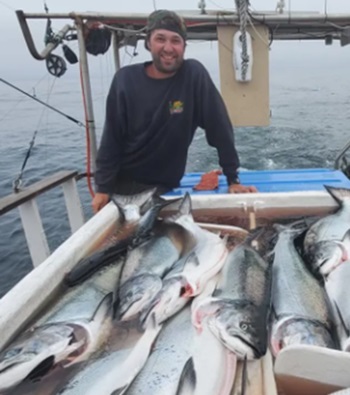 This time of year, Ben Hyman of Wild Local Seafood would like to be out on a boat, fishing for salmon. But for the second year in a row, federal fishery managers have closed all salmon fishing in California. The decision has devastated the state’s fishermen. “The Sacramento River system and the various rivers that stem from it are major producers of king salmon. Some of the largest runs in the world, and especially on the West Coast, have [come] from this river system,” Hyman says. “A lot of the fishing seasons are determined by how many fish make their way up the rivers. “Last year’s closure cost California fishermen approximately $45 million, with some sources saying that is only a fraction of the loss. Hyman says many of his colleagues have left the industry, including third-generation fishermen and those in the business for more than 50 years. more, >>CLICK TO READ<< 07:42
This time of year, Ben Hyman of Wild Local Seafood would like to be out on a boat, fishing for salmon. But for the second year in a row, federal fishery managers have closed all salmon fishing in California. The decision has devastated the state’s fishermen. “The Sacramento River system and the various rivers that stem from it are major producers of king salmon. Some of the largest runs in the world, and especially on the West Coast, have [come] from this river system,” Hyman says. “A lot of the fishing seasons are determined by how many fish make their way up the rivers. “Last year’s closure cost California fishermen approximately $45 million, with some sources saying that is only a fraction of the loss. Hyman says many of his colleagues have left the industry, including third-generation fishermen and those in the business for more than 50 years. more, >>CLICK TO READ<< 07:42
Gulf of Alaska trawl pollock vessels to be included in electronic monitoring program
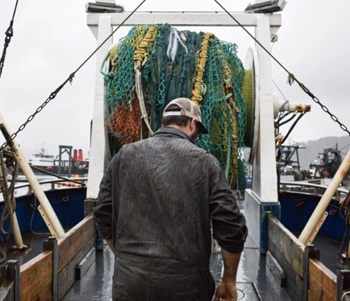 According to the 2023 annual report from the North Pacific Observer Program, the vast majority of groundfish harvest in Alaska is observed with full coverage, meaning 100% of all trips are monitored by either onboard observers or electronic monitoring. After years of testing the program, electronic monitoring will soon be expanded to include pelagic trawl pollock catcher vessels and tenders delivering to shoreside processors or stationary floating processors, across the Bering Sea and Aleutian Islands, and the Gulf of Alaska. That includes vessels that already have an observer on board. more, >>CLICK TO READ<< 07:55
According to the 2023 annual report from the North Pacific Observer Program, the vast majority of groundfish harvest in Alaska is observed with full coverage, meaning 100% of all trips are monitored by either onboard observers or electronic monitoring. After years of testing the program, electronic monitoring will soon be expanded to include pelagic trawl pollock catcher vessels and tenders delivering to shoreside processors or stationary floating processors, across the Bering Sea and Aleutian Islands, and the Gulf of Alaska. That includes vessels that already have an observer on board. more, >>CLICK TO READ<< 07:55
The federal government is assuming management of salmon fishing in parts of Alaska’s Cook Inlet
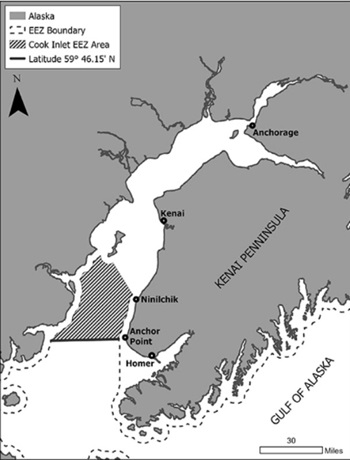 Commercial and recreational salmon fishing in the federal waters of Cook Inlet will resume this summer, but under new management by the federal government, according to a rule made final this week. Until now, the state had managed salmon fisheries in both state and federal waters of the inlet. But the switch in management was ordered by federal courts, as a result of litigation stretching back a decade. The United Cook Inlet Drift Association, or UCIDA, which is made up of commercial salmon fishers, sued the federal government in 2013 for failing to develop a salmon harvest management plan for the federal waters of the inlet. more, >>CLICK TO READ<< 13:11
Commercial and recreational salmon fishing in the federal waters of Cook Inlet will resume this summer, but under new management by the federal government, according to a rule made final this week. Until now, the state had managed salmon fisheries in both state and federal waters of the inlet. But the switch in management was ordered by federal courts, as a result of litigation stretching back a decade. The United Cook Inlet Drift Association, or UCIDA, which is made up of commercial salmon fishers, sued the federal government in 2013 for failing to develop a salmon harvest management plan for the federal waters of the inlet. more, >>CLICK TO READ<< 13:11
Where Have All The Right Whales Gone?
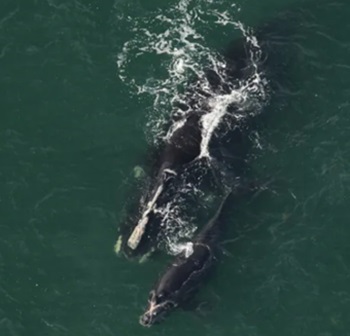 Marine researchers have mapped the density of one of the most endangered large whale species worldwide, the North Atlantic right whale, using newly analyzed data to predict and help avoid whales’ harmful, even fatal, exposure to commercial fishing and vessel strikes. Duke University’s Marine Geospatial Ecology Lab led a collaboration of 11 institutions in the United States that pooled 17 years of available visual survey data covering 9.7 million square kilometers of the U.S. Atlantic – roughly the same area as the entire contiguous United States. more, >>click to read<< 16:37
Marine researchers have mapped the density of one of the most endangered large whale species worldwide, the North Atlantic right whale, using newly analyzed data to predict and help avoid whales’ harmful, even fatal, exposure to commercial fishing and vessel strikes. Duke University’s Marine Geospatial Ecology Lab led a collaboration of 11 institutions in the United States that pooled 17 years of available visual survey data covering 9.7 million square kilometers of the U.S. Atlantic – roughly the same area as the entire contiguous United States. more, >>click to read<< 16:37
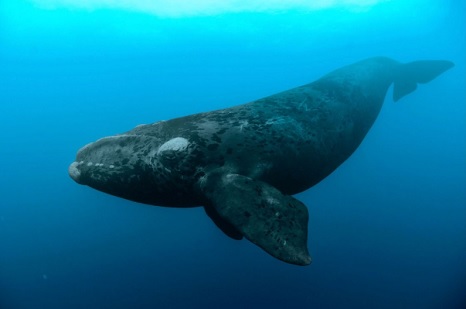
OFFSHORE WIND AND WHALES – A collection of articles from fisherynation.com By Jim Lovgren
After over forty-five years as a commercial fisherman out of Point Pleasant NJ, I sold my boat the Shadowfax, and retired, moving to California. My experience as a fisherman began in the early 1970’s, and I observed and learned an encyclopedia of knowledge concerning fishing, the environment, and fishery management, including politics. As I observed the continuing massacre and the lies denying them by government and media puppets, I under took an effort to expose the truth concerning offshore wind. The following articles are listed in order of their appearance in Fisherynation.com, and are best understood by reading them in order. Just click on the title of an article you’d like to read. more, >>click to read<< 15:09
Biden administration sued over Virginia offshore wind farm approval
 A conservative think tank on Monday sued the Biden administration in an effort to reverse approval of what would be the largest offshore wind farm of its kind. The Heartland Institute filed the suit with the Committee for a Constructive Tomorrow, a nonprofit that advocates for an economically libertarian approach to environmental action and has denied the existence of human-caused climate change. The lawsuit, filed in the U.S. District Court for the District of Columbia, seeks to reverse the National Marine Fisheries Service (NMFS) Bureau of Ocean Energy Management’s (BOEM) approval of Dominion Energy’s 176-turbine wind project offshore Virginia. more, >>click to read<< 08:30
A conservative think tank on Monday sued the Biden administration in an effort to reverse approval of what would be the largest offshore wind farm of its kind. The Heartland Institute filed the suit with the Committee for a Constructive Tomorrow, a nonprofit that advocates for an economically libertarian approach to environmental action and has denied the existence of human-caused climate change. The lawsuit, filed in the U.S. District Court for the District of Columbia, seeks to reverse the National Marine Fisheries Service (NMFS) Bureau of Ocean Energy Management’s (BOEM) approval of Dominion Energy’s 176-turbine wind project offshore Virginia. more, >>click to read<< 08:30
Here’s how activists use lobstermen as bait to endanger Maine industry, communities
 Far left activists are exploiting the recent death of an endangered whale to imperil the future of Maine’s iconic lobster fishery. These organizations have poor command of the facts and no knowledge of our industry. Their agitating imperils our fishery and the working communities that depend on it. Organizations like the National Resources Defense Council, the Conservation Law Foundation and others are exploiting this event to pressure regulators to impose new rules. These organizations are restless and can claim some success. A self-styled watchdog called Seafood Watch convinced Whole Foods to stop stocking Maine lobster products late in 2022. 3 Videos, more, >>click to read<< By Dustin Delano 16:12
Far left activists are exploiting the recent death of an endangered whale to imperil the future of Maine’s iconic lobster fishery. These organizations have poor command of the facts and no knowledge of our industry. Their agitating imperils our fishery and the working communities that depend on it. Organizations like the National Resources Defense Council, the Conservation Law Foundation and others are exploiting this event to pressure regulators to impose new rules. These organizations are restless and can claim some success. A self-styled watchdog called Seafood Watch convinced Whole Foods to stop stocking Maine lobster products late in 2022. 3 Videos, more, >>click to read<< By Dustin Delano 16:12
New England Fishermen Fear NOAA Retaliation as Feds Pin Dead Whale on Maine Lobstermen
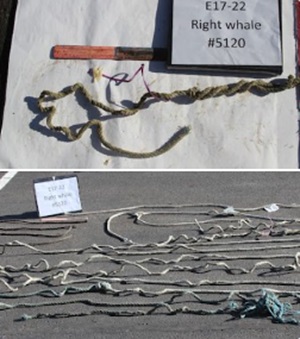 For the first time in twenty years, the death of a North Atlantic Right Whale has been linked to Maine fishing gear, according to a federal environmental agency. Found dead off of Martha’s Vineyard on January 28 near Joseph Sylvia State Beach, the juvenile, female whale was described as having been entangled in a rope that was “deeply embedded in the tail.” According to the U.S. Commerce Department’s National Oceanic and Atmospheric Administration (NOAA) — parent agency of the National Marine Fisheries Service (NMFS) — the rope found on the whale contained purple markings that are consistent with water trap and pot buoy lines used by lobstermen in Maine. Photos, more, >>click to read<< 07:22
For the first time in twenty years, the death of a North Atlantic Right Whale has been linked to Maine fishing gear, according to a federal environmental agency. Found dead off of Martha’s Vineyard on January 28 near Joseph Sylvia State Beach, the juvenile, female whale was described as having been entangled in a rope that was “deeply embedded in the tail.” According to the U.S. Commerce Department’s National Oceanic and Atmospheric Administration (NOAA) — parent agency of the National Marine Fisheries Service (NMFS) — the rope found on the whale contained purple markings that are consistent with water trap and pot buoy lines used by lobstermen in Maine. Photos, more, >>click to read<< 07:22
Dungeness Crab season begins January 5
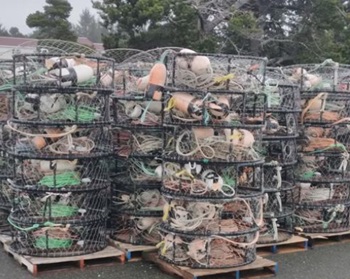 The commercial Dungeness crab season commences in Del Norte County, this week. The California Department of Fish and Wildlife (DFWD) announced the Dungeness season is now open in zones 1 and 2, Sonoma County line to the Oregon border. The delay in zones 3-6, South of the Sonoma / Mendocino will continue to be restricted. Multiple delays in opening the Crab season have been attributed to excessive humpback whale entanglements and the high number of whale sightings, according to the DFWD Assessment and Mitigation program. more, >>click to read<< 17:25
The commercial Dungeness crab season commences in Del Norte County, this week. The California Department of Fish and Wildlife (DFWD) announced the Dungeness season is now open in zones 1 and 2, Sonoma County line to the Oregon border. The delay in zones 3-6, South of the Sonoma / Mendocino will continue to be restricted. Multiple delays in opening the Crab season have been attributed to excessive humpback whale entanglements and the high number of whale sightings, according to the DFWD Assessment and Mitigation program. more, >>click to read<< 17:25
Coalition files intent to sue federal agencies to stop whale-killing Virginia wind project
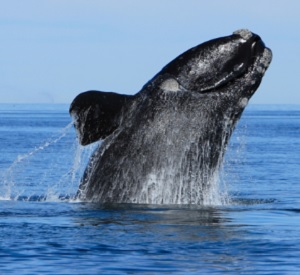 The Committee for a Constructive Tomorrow (CFACT) and The Heartland Institute today announced that they were filing with the Bureau of Ocean Energy Management (BOEM) and the National Marine Fisheries Service (NMFS) a 60 Day Notice of Intent to Sue letter for a violation of the Endangered Species Act. The violation is contained in a defective “biological opinion,” which authorizes the construction of the Virginia Offshore Wind Project (VOW). The 60-day notice is required by the Endangered Species Act (ESA) for parties who wish to commence litigation against BOEM for failure to provide adequate protection of the North Atlantic right whale and other endangered species. The North Atlantic right whale is listed as “critically endangered” by the governments of both the Commonwealth of Virginia and the United States. >>click to read<< 12:23
The Committee for a Constructive Tomorrow (CFACT) and The Heartland Institute today announced that they were filing with the Bureau of Ocean Energy Management (BOEM) and the National Marine Fisheries Service (NMFS) a 60 Day Notice of Intent to Sue letter for a violation of the Endangered Species Act. The violation is contained in a defective “biological opinion,” which authorizes the construction of the Virginia Offshore Wind Project (VOW). The 60-day notice is required by the Endangered Species Act (ESA) for parties who wish to commence litigation against BOEM for failure to provide adequate protection of the North Atlantic right whale and other endangered species. The North Atlantic right whale is listed as “critically endangered” by the governments of both the Commonwealth of Virginia and the United States. >>click to read<< 12:23
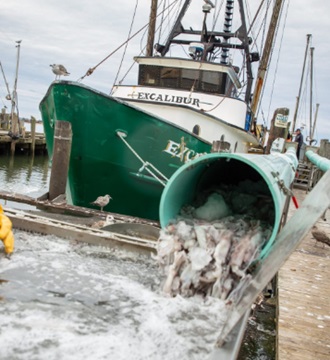
Landmark Legal Battle: Fishermen Challenge Regulatory Overreach Impacting Livelihoods
In a pivotal move, the Supreme Court has accepted a second challenge to the long-standing legal doctrine known as “Chevron deference.” This doctrine, born from a 1984 ruling, grants federal agencies substantial authority in formulating rules and regulations. The case, Relentless Inc. v U.S. Department of Commerce, represents a crucial juncture for Rhode Island fishermen who, along with those in the Loper Bright Enterprises v. Raimondo case, are fervently contesting a federal rule that mandates them to bear the financial burden of federal observers on their boats. >>click to read<< 12:23
As the once-lucrative Bering Sea crab harvest resumes, Alaska’s fishers face challenges
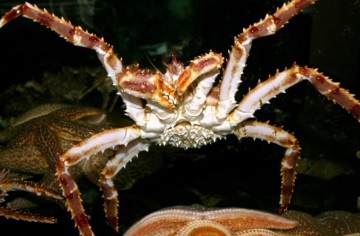 In the short term, Alaska crab fishers and the communities that depend on them will get a slight reprieve from the disastrous conditions they have endured for the past two years, with harvests for iconic red king crab to open on Sunday. In the long term, the future for Bering Sea crab and the people who depend on it is clouded by environmental and economic upheaval. The decision by the Alaska Department of Fish and Game to open harvests of Bristol Bay red king crab after an unprecedented two-year shutdown was a close call, a state biologist told industry members during a meeting on Thursday. >>click to read<< 16:08
In the short term, Alaska crab fishers and the communities that depend on them will get a slight reprieve from the disastrous conditions they have endured for the past two years, with harvests for iconic red king crab to open on Sunday. In the long term, the future for Bering Sea crab and the people who depend on it is clouded by environmental and economic upheaval. The decision by the Alaska Department of Fish and Game to open harvests of Bristol Bay red king crab after an unprecedented two-year shutdown was a close call, a state biologist told industry members during a meeting on Thursday. >>click to read<< 16:08
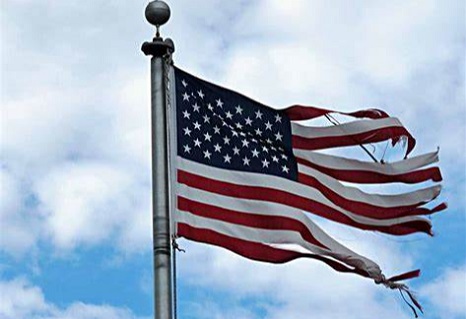
OFFSHORE WIND OPPONENTS NEED A MASS PROTEST IN WASHINGTON DC – BY JIM LOVGREN
In 2010 and 2012 fishermen held two different successful protests in Washington DC with thousands of fishermen travelling from around the country to attend. Both commercial and recreational fishermen voiced their concerns regarding catch shares and Magnuson Act reauthorization, among the multitude of issues that threatened their livelihoods. Today, the fishing industry is facing a far worse enemy then fishery management, as thousands of square miles of their historic fishing grounds have been auctioned off to the highest bidder in order to make way for the wildlife killing machines called wind turbines. These auctions have been held by BOEM, the Bureau of Ocean Energy Management, a part of the Department of the Interior. They are charged with the selling or leasing of US natural resources in our offshore waters, and apparently, they have absolutely no regard for any wildlife that may exist within them, or any people who might derive a living from catching said wildlife. >click to read< 11:50
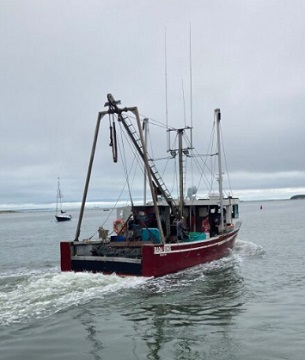
The Cape’s Scallopers Ride Out a Perfect Storm
This summer, a perfect storm combining sky-high fuel costs, a scarcity of experienced crew members, low wholesale prices, sharp declines in what scallop fishermen are allowed to take, and costly quota, has been keeping Cape Cod’s small-boat scallopers off the water. “There are a quite a few changing over to do other kinds of fishing because they can’t afford to go scalloping right now,” said Max Nolan, a scalloper from Eastham who owns the F/V Outlaw. “I don’t know how anyone is making it,” said Chris Merl, a Wellfleet scalloper and captain of the F/V Isabel & Lilee. Atlantic scalloping, which stretches from the waters of Maine to North Carolina, is one of the most lucrative fisheries in the nation, with its yearly catch valued at upwards of $500 million. But this year (the fishing year begins in April and ends in March), regulators have dropped the total amount of scallops boats are allowed to harvest to its lowest level in over a decade, and the limit stands at just 41 percent of what it was in 2019. >click to read< 08:55
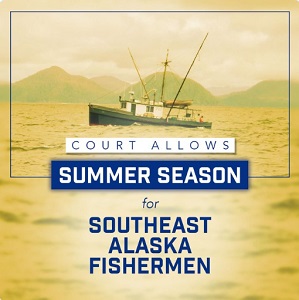
Alaska’s fishermen and communities celebrate decision to allow Southeast Alaska’s Chinook troll fishery to open on July 1st
Southeast Alaska’s fishermen and communities welcomed the U.S. 9th District Court of Appeals’ decision on June 21st to keep Southeast Alaska’s Chinook troll fishery open while the National Marine Fisheries Service (NMFS) addresses a technicality in its 2019 Biological Opinion for Southeast Alaska’s salmon fisheries. In its order, the federal appeals panel shared that there was ample evidence submitted showing that the impacts of shutting down the Alaska salmon fishing industry would “outweigh the speculative environmental threats” of keeping the fishery open. “The court’s decision is a huge relief for hundreds of small-boat fishing families that rely on this fishery for their income,” said Linda Behnken, Executive Director of the Alaska Longline Fishermen’s Association. >click to read< 07:15
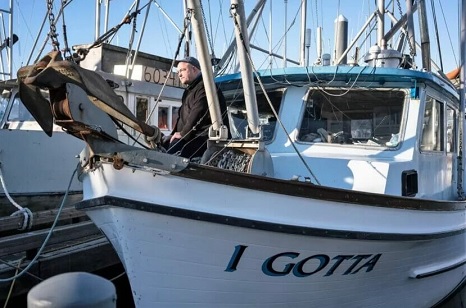
3 Alaska trollers contemplate a summer without chinook
Barring a stay, or a successful appeal, or other eleventh-hour legal action, there will be no troll fishery for king salmon in Southeast Alaska either this summer or winter. The fisheries have been canceled by order of the U.S. District Court of Western Washington on largely procedural grounds. According to the ruling they stem from a violation of the Endangered Species Act, and the failure of the National Marine Fisheries Service to fully address the impact of Alaska’s king salmon trollers on an endangered population of orcas in Puget Sound called Southern Resident killer whales. No other salmon species or commercial gear group or sport fishery anywhere on the entire Pacific Northwest coast is affected by the order, just commercial trolling for king salmon in Southeast Alaska. photos, >click to read/listen< 13:39
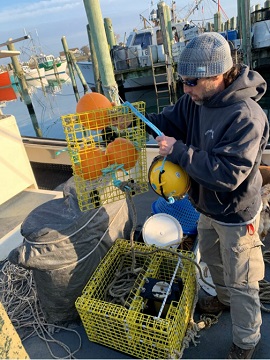
‘Ropeless’ Fishing Gear Aims to Protect Whales, But Adds Complications, Costs
Using federal experimental fishing permits, three Port Judith-based lobstermen are struggling to use the new gear, borrowed from the National Marine Fisheries Service (NMFS), a branch of NOAA Fisheries. On a recent sunny April morning, Richard Lodge and his sea dogs Rudder and Dory were preparing to embark from his dock at Point Judith on his boat Select for a day of lobster fishing using the experimental gear. “Ropeless technology is excessive; I honestly don’t think it is necessary,” Lodge said. “This is a solution to a problem that isn’t there.” He and other Point Judith-based lobstermen said that in decades of time at sea, they don’t know of one instance in which whales were entangled in their lines. >click to read< 09:40






